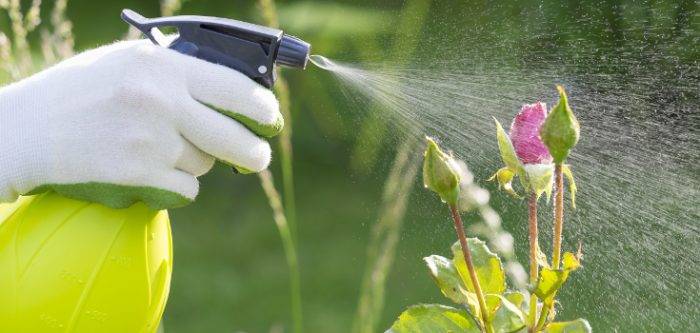By Kimani Wiseman
What can be very frustrating for a farmer, is when you have worked very hard in the hot sun and rain to get your crops in the ground, and within a couple of days or weeks, they are all covered in “weeds”.
Weeds are wild plants growing where it is not wanted and competing with cultivated plants. Weeds compete with crops for nutrients, space, and light, thus lowering production. They also harbour pests that attack plants and also lower the quality of your produce, hence herbicides are very popular among farmers.
Herbicides destroy weeds very fast, which is very beneficial to the farmer, but on the other hand, they affect the environment and human health. According to a CNN news article on Feb. 15, 2019, “glyphosate”, an ingredient in the herbicide Roundup, increases the cancer risk of non Hodgkin lymphoma (NHL), a cancer of the immune system, by 41 per cent. In 2018, in the United States, traces of glyphosate was found in two dozen popular general mills and Quaker breakfast cereals and snack bars.
In the Caribbean, Gramoxone is a popular herbicide used among farmers. Farmers who use gramoxone, and have a cut or wound, if their body is not properly covered while spraying, the gramoxone can enter through that cut and cause poisoning. Poisoning from Gramoxone can also occur if fruits and vegetables that might contain traces of Gramoxone are not washed properly.
Inhaling a toxic amount of gramoxone can cause swelling and pain in the mouth and throat. Herbicides can kill pollinating insects such as bees and butterflies which are crucial for food security. Herbicides can be washed away very easily into streams, which can kill fishes and other marine animals and can even seep into ground water. They can also kill micro organisms in the soil.
Here are some solutions for weed control:
- Plain vinegar would kill any plant you don’t want. Vinegar contains 5 per cent acetic acid. Acetic acid, from any source would kill most vegetation because it draws all the moisture out of the leaf.
- Mechanical methods which involves hand pulling, hoeing, ploughing, forking, or harrowing.
- Cultural methods which involves crop rotation, mulching.
- Biological control which involves the use of parasites to feed on weeds.
Organic agriculture occupies only 1 per cent of global agricultural land. Farmers and persons who are involved in backyard gardening should use less herbicides, pesticides, synthetic fertilisers, insecticides, and try to grow more organic crops, which would enable us to protect the environment, and for all of us to live much healthier and longer lives.







I couldn’t agree more with the information deriving out of this very important and informative article which is like an easy pill going smoothly down my throat. Very commendable of Mr. Chance in publishing interesting articles such as these.
It is good that this topic is appearing on this website in SVG. It is however too brief. Truth is, Gramoxone
does not have Glyphosate. Also note that vinegar, even diluted makes your soils overly acidic that can cause a poor crop for most anything you plant in that soil afterwards.
I would be more appreciative if someone would provide research facts on any harmful effects of Gramoxone, since that is the herbicide of choice in SVG.
Please read the article carefully, nowhere in the article mentioned that glyphosate is found in gramoxone, it was mentioned that glyphosate is found in “round up”.If the soil might be a bit acidic, that can be solved with lime, lime is alkaline. What would you rather, continue using all these chemicals that are destroying the environment and putting people health at risk, or to use vinegar that can kill a lot of these weeds, and help to reduce the use of some of these herbicides.
Please!
I did not say you said glyphosate is in Gramoxone even though you infer it very strongly in your article. You talk about glyphosate but make sure not to say it is absent in Gramoxone. Please read my comment more carefully. I am sure that Gramoxone is also toxic. You mention only that it causes swelling and pain. Since we use Gramoxone so much and glyphosate is banned then why did you write an article more about Glyphosate? Why didn’t you tell us more about the effects of Gramoxone?
The real truth is that SVG has so destroyed our economy with high taxes and duties, making farm labor so expensive (more than most anywhere in the world) that in order for the farmers to make a dollar they feel compelled to use herbicides or go bankrupt.
But you did say that the article mentioned that glyphosate is in gramoxone. These were your exact words.Truth is, gramoxone does not have glyphosate.I wrote this article not only to speak about gramoxone, i wrote about the effects of herbicides, which gramoxone is a herbicide and i also wrote about round up, then i went on further,and i wrote about the effects that all herbicides have on the environment. To conclude, this article is mainly to promote “organic farming” and if you look at the ending of the article,you would notice that i mentioned organic farming.
I hope K. Wiseman is an organic farmer who makes a decent living from his pursuit.
Most of the advocates engage in wishful thinking because they were never engaged in farming, and have no intention to become engaged.